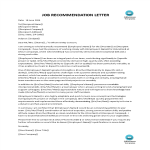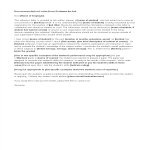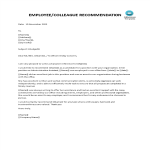Job recommendation example templates
Why is a Good Job Recommendation Letter Important?
A good job recommendation letter is a powerful tool in the job application process. It provides a third-party endorsement of a candidate’s qualifications, work ethic, and character, significantly enhancing their chances of securing the desired position.
Credibility and Validation: A strong recommendation letter offers external validation of the candidate’s skills and achievements. It assures potential employers that the candidate has been recognized and appreciated by previous employers, adding credibility to their application.
Firsthand Insight: A well-written recommendation letter provides firsthand insight into the candidate’s performance in a professional setting. It highlights specific examples of their contributions, work style, and how they handle responsibilities.
Personalized Endorsement: Personalized recommendations are more impactful. They highlight the candidate’s unique strengths and accomplishments, making them stand out from other applicants. A good recommendation should include specific instances of the candidate’s success.
Soft Skills Highlight: While resumes focus on technical skills, recommendation letters can emphasize the candidate’s soft skills. It showcases their communication, leadership, and teamwork abilities, which are crucial for workplace success.
Trust Building: Employers are more likely to trust the judgment of a respected professional reference. A strong endorsement from a reputable source can significantly influence the hiring decision, building trust in the candidate’s capabilities.
Holistic View: A recommendation letter provides a more holistic view of the candidate, complementing the information on their resume. It helps employers understand the candidate’s overall fit for the role and the organization.
What Should Be in a Good Recommendation Letter?
Introduction: The letter should start with an introduction that states the recommender’s name, position, and relationship with the candidate. It should also mention the duration of this relationship.
Specific Skills and Qualities: Detail the candidate’s key skills and qualities. Highlight both technical and soft skills, providing specific examples that demonstrate these abilities in action.
Accomplishments and Contributions: Include specific achievements and contributions made by the candidate. Mention successful projects, leadership roles, and any recognitions or awards received.
Work Ethic and Professionalism: Describe the candidate’s work ethic, reliability, and professionalism. Provide examples of their dedication, problem-solving abilities, and how they handle challenges.
Interpersonal Skills: Highlight the candidate’s interpersonal skills, such as teamwork, communication, and relationship-building. Mention how they interact with colleagues, clients, and other stakeholders.
Conclusion: Summarize why the candidate would be a valuable addition to the prospective employer’s team. Offer your contact information for any follow-up questions or further discussion.
A good recommendation letter is essential for showcasing a candidate’s strengths and potential, providing a comprehensive and credible endorsement that can greatly enhance their job prospects.
-
Job Recommendation Letter From Professor
How to write a Job Recommendation Letter from Professor? Download this Job Recommendation Letter from Professor template now!
View template -
Recommendation Letter from Professor for Job
How to create a Recommendation Letter from Professor for Job? Why is a Good Job Recommendation Letter Important? Download this Recommendation Letter from Professor for Job template now!
View template -
Employee Recommendation Letter Sample
What is the definition of a recommendation letter for employment? Download this sample recommendation letter template now which is designed to help you write a letter that highlights your skills and experience.
View template
Latest topics
- Excel Templates
Where do I find templates for Excel? How do I create a template in Excel? Check these editable and printable Excel Templates and download them directly! - GDPR Compliance Templates
What do you need to become GDPR compliant? Are you looking for useful GDPR document templates to make you compliant? All these compliance documents will be available to download instantly... - Google Docs Templates
How to create documents in Google Docs? We provide Google Docs compatible template and these are the reasons why it's useful to work with Google Docs... - IT Security Standards Kit
What are IT Security Standards? Check out our collection of this newly updated IT Security Kit Standard templates, including policies, controls, processes, checklists, procedures and other documents. - Letter Format
How to format a letter? Here is a brief overview of common letter formats and templates in USA and UK and get inspirited immediately!


